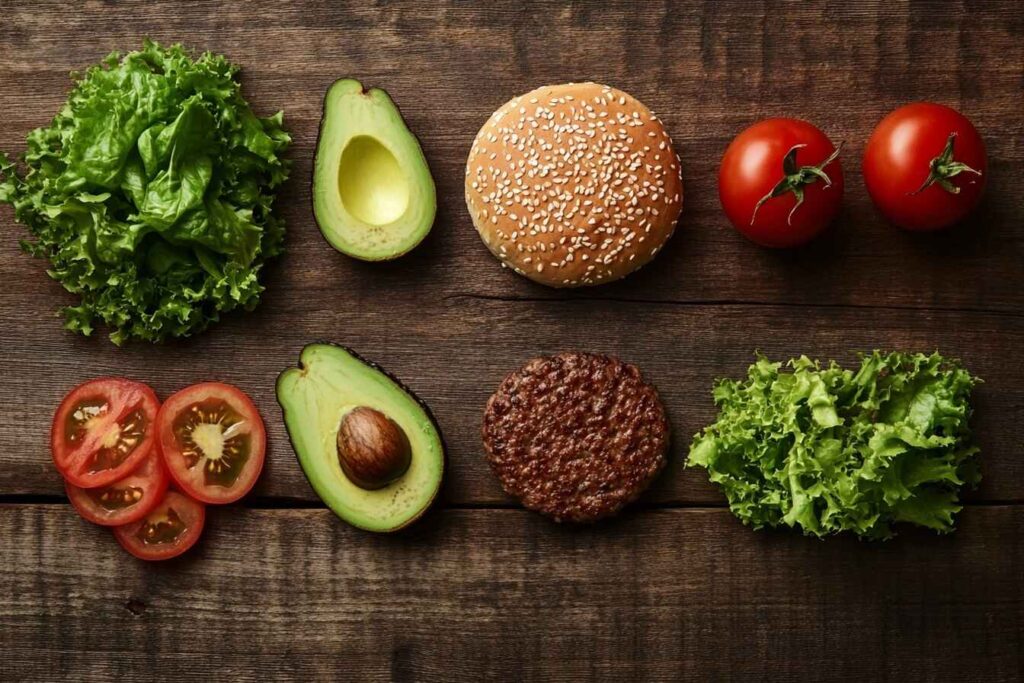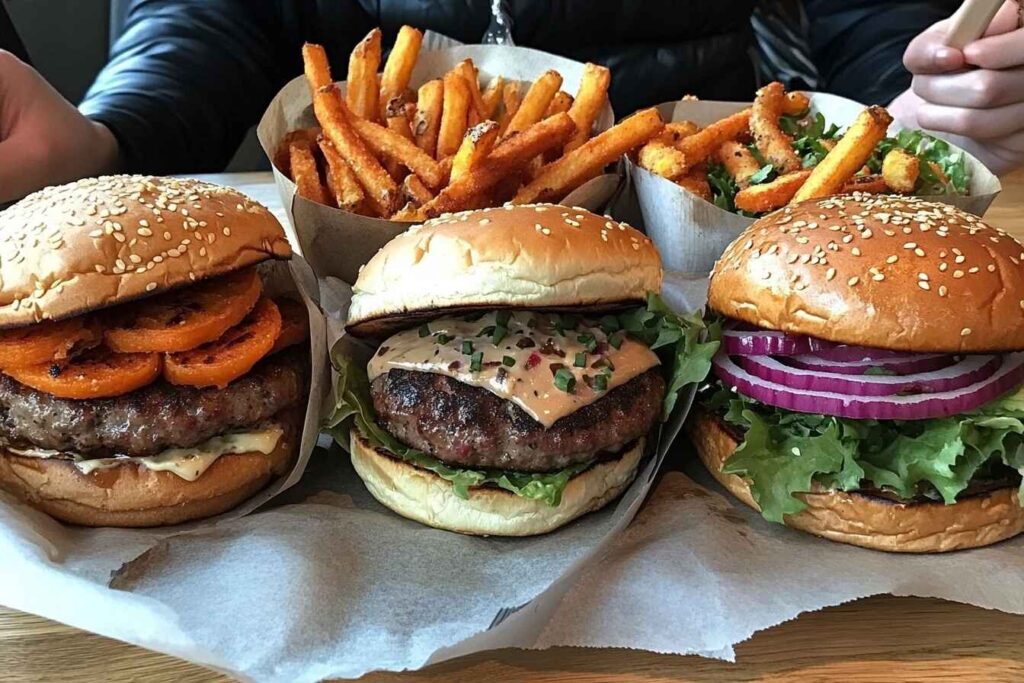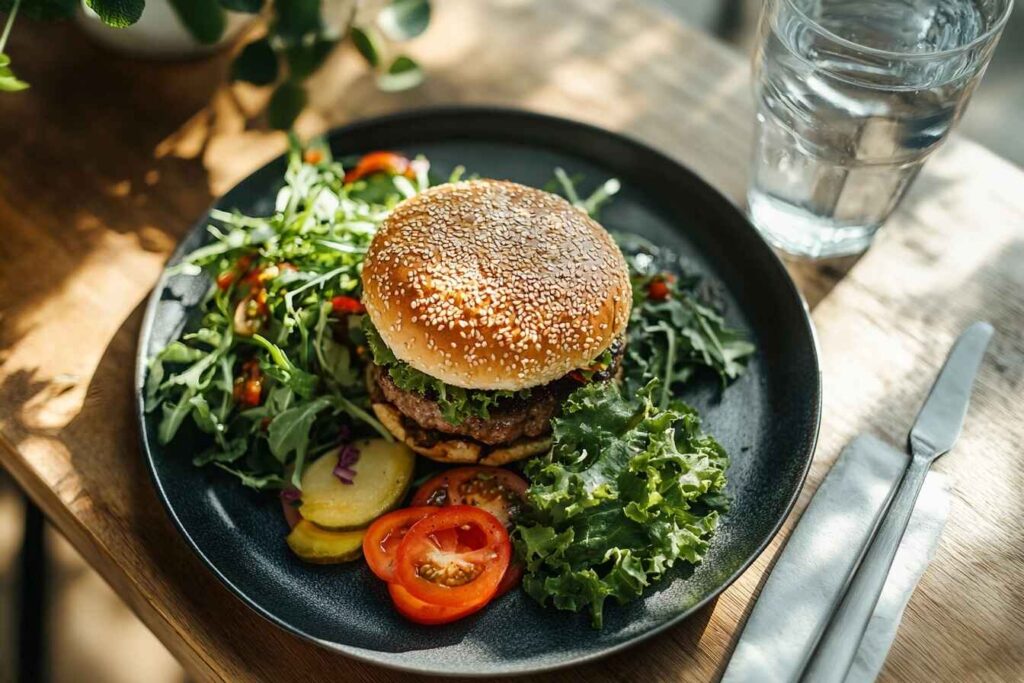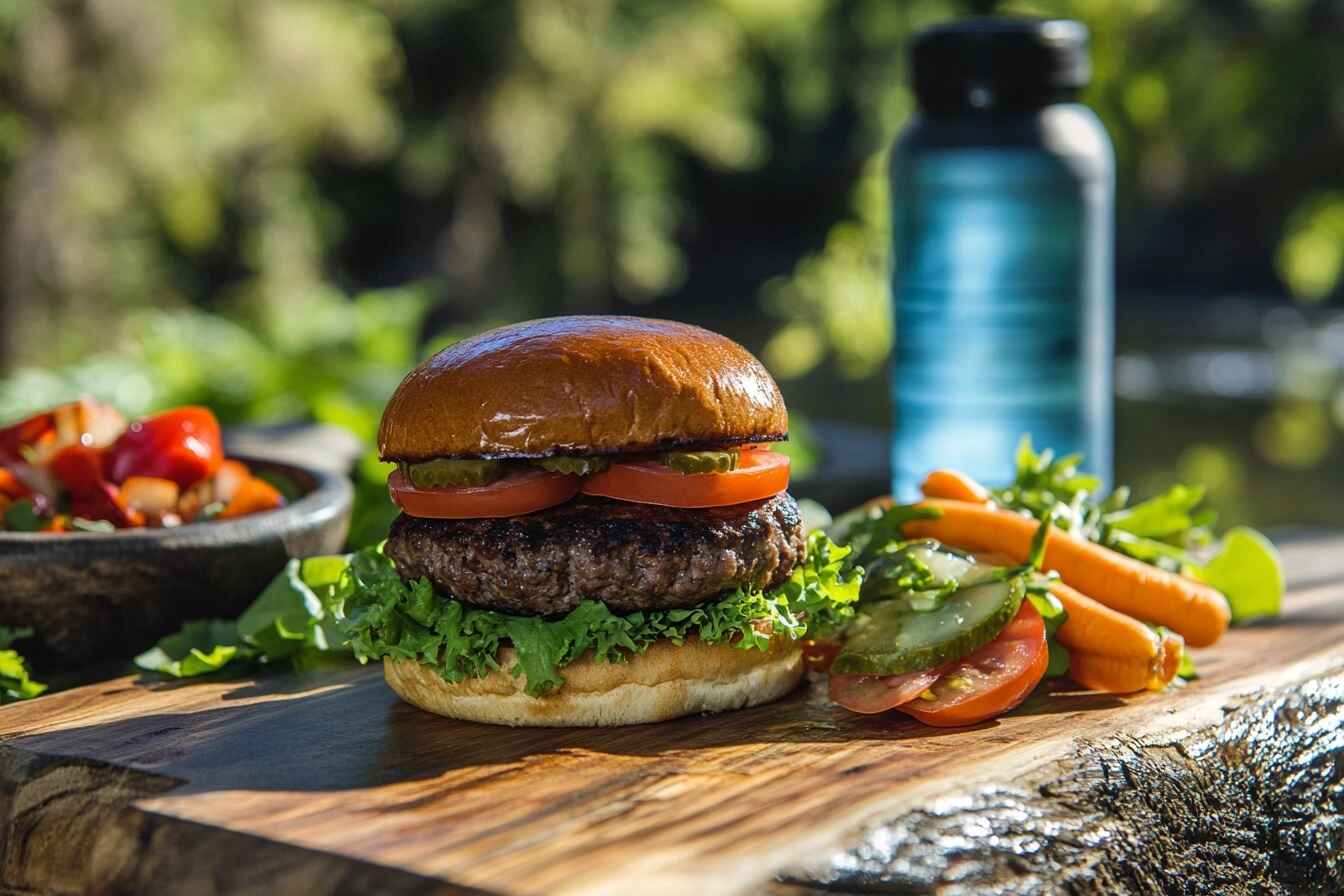Let’s face it: burgers are delicious, and most of us can’t resist the occasional craving for one. But if you’re an athlete, you might be wondering: can I enjoy a burger without wrecking my diet or performance? The short answer is yes—but it’s all about balance, timing, and making informed choices. In this article, we’ll dive into everything you need to know about whether athletes can eat burgers and how to make this indulgence work for your goals. One of the most common questions in sports nutrition is: Can athletes eat burgers? This article dives deep into answering that question.
Table of contents
Introduction: Debunking Myths About Athletes and Burgers
There’s a common misconception that athletes need to stick to strict, boring diets filled with plain chicken, broccoli, and rice. While it’s true that nutrition plays a huge role in athletic performance, it doesn’t mean you have to ban all your favorite foods. Burgers, for instance, can fit into an athlete’s meal plan when consumed mindfully.
Think about it this way: athletes aren’t robots. They’re humans with cravings, just like you and me. The key is understanding how a burger fits into your overall nutrition strategy.
Nutritional Overview of Burgers: What’s Inside?

To determine whether burgers are suitable for athletes, we first need to look under the hood—or rather, under the bun! Let’s break down the typical components of a burger:
Protein Content in Burgers: Good or Bad for Athletes?
Protein is the MVP of nutrition for athletes, helping repair and build muscle after intense workouts. A typical beef patty contains around 20-30 grams of protein, depending on its size. That’s a solid contribution to your daily protein needs. However, not all protein is created equal. The quality of the meat matters—leaner cuts like ground turkey or chicken can provide high-quality protein without the excess fat.
Carbohydrates and Fats in Burgers: Balancing Macros
Here’s where things get tricky. The bun, condiments, and cheese add carbs and fats, which are essential nutrients but can quickly pile up. A standard burger might contain 40-50 grams of carbohydrates and 15-30 grams of fat. For athletes, carbs are essential for energy, but too much saturated fat can weigh you down. The key? Balance your macros by customizing your burger.
Table: Typical Nutrition Facts for a Regular Cheeseburger
| Nutrient | Quantity Per Serving (1 Burger) |
|---|---|
| Calories | 500-700 |
| Protein | 20-30g |
| Carbohydrates | 40-50g |
| Fat | 15-30g |
| Sodium | 900-1200mg |
“Burgers aren’t the villain they’re made out to be. Like any food, it’s all about how you approach them—moderation and customization are your best friends.” 🌟
The Role of Burgers in an Athlete’s Diet
The big question: can a burger contribute to your performance? Let’s explore
Occasional Indulgence vs. Regular Consumption
A burger here and there won’t derail your goals. Occasional indulgences can keep you motivated and prevent burnout from overly restrictive diets. On the flip side, making burgers a daily habit might lead to issues like excessive fat intake and reduced energy levels. Can athletes eat burgers regularly? The answer depends on how often and how they’re prepared.
Timing Matters: When Can an Athlete Eat a Burger?
Timing is everything. Eating a heavy burger before a workout might leave you feeling sluggish (and regretting your choices). However, enjoying one after an intense training session can replenish calories and provide some well-deserved comfort food.
Customizing Burgers for Athletes: Healthy Tweaks

Good news: you don’t have to give up burgers altogether. With a few smart adjustments, you can transform them into a more athlete-friendly option.
Lean Protein Choices for the Patty
Swap the fatty beef for ground turkey, chicken, or even a plant-based alternative like a black bean patty. These options reduce saturated fat without compromising on protein.
Whole-Grain Buns: A Better Alternative
Refined white buns may lack fiber, leading to quicker energy crashes. Opt for whole-grain buns for a steady release of energy and added nutrients.
Adding Nutrient-Rich Toppings: Vegetables and More
Skip the sugary ketchup and mayo, and load up on fresh veggies like lettuce, tomatoes, onions, and avocado. These toppings add fiber, vitamins, and a burst of flavor.
“Think of your burger like a blank canvas. With the right ingredients, you can create a masterpiece that satisfies both your taste buds and your nutritional needs.” 🎨🍔
Common Concerns About Burgers for Athletes
Even with healthier tweaks, some athletes still hesitate to enjoy a burger. Why? It’s often due to concerns about health impacts. Let’s tackle some of this head-on.
High Saturated Fats: How Much Is Too Much?
One of the biggest criticisms of burgers is their saturated fat content. Too much saturated fat can increase cholesterol levels and impact cardiovascular health. For athletes, this can be especially concerning since heart health is crucial for endurance and performance.
So, how much is too much? Nutrition experts recommend limiting saturated fat to about 10% of your daily calorie intake. If you’re indulging in a burger, balance it out with lower-fat meals throughout the day.
Processed Ingredients: Identifying Health Risks
Fast-food burgers often come with additives, preservatives, and processed meats, which can pose long-term health risks. The solution? Go homemade! Making your burger lets you control the quality of ingredients and avoid unnecessary additives.
The Science of Cheat Meals: Benefits and Risks

Occasionally indulging in a burger can boost your morale and prevent diet fatigue. However, moderation is crucial to avoid feeling sluggish or guilty. For a fun take, explore Burger King Breakfast Options that fit into an active lifestyle.
Psychological Benefits of Eating Burgers Occasionally
Imagine this: you’ve stuck to your strict meal plan all week, and now it’s burger night. That first bite? Pure happiness. Cheat meals like burgers can provide a much-needed mental break from dietary discipline, helping you stay on track in the long run.
It’s like rewarding your brain for all the hard work—it keeps you motivated and prevents feelings of deprivation.
Potential Negative Impacts of Overindulgence
Of course, there’s a flip side. Overindulging in cheat meals can lead to bloating, sluggishness, and guilt. The trick is moderation. Think of cheat meals as a way to indulge responsibly rather than going on a full-blown junk food spree.
Real-Life Examples: Athletes Who Enjoy Burgers
You might be surprised to learn that some of the world’s top athletes are burger lovers. Let’s take a look at a few examples.
Celebrated Athletes and Their Favorite Burgers
- Usain Bolt, the fastest man in the world, has openly shared his love for burgers. While training for the Olympics, he indulged in his favorite fast food but kept it in check with his rigorous workout routine.
- Serena Williams, a tennis legend, has been spotted enjoying burgers during her cheat meals. Her approach? Balance indulgence with nutrient-dense meals and intense training.
Lessons from Their Diets: Moderation Is Key
The takeaway here is simple: even the best athletes indulge occasionally. The key is knowing when and how to incorporate a treat like a burger without compromising overall health and performance.
“If Usain Bolt can enjoy a burger and still dominate the track, you can too—as long as you’re smart about it!” 🏃♂️🍔
Table: Healthy Burger Alternatives for Athletes
| Ingredient | Standard Option | Athlete-Friendly Option |
|---|---|---|
| Patty | Fatty ground beef | Lean turkey, chicken, or plant-based |
| Bun | White bread | Whole-grain or lettuce wrap |
| Toppings | Processed cheese, mayo | Fresh veggies, avocado, hummus |
| Side | Fries | Sweet potato fries or salad |
Tips for Including Burgers in a Balanced Athlete’s Diet
Can athletes eat burgers as part of their meal plan? Absolutely, if they follow these simple tips.
Pre-Workout vs. Post-Workout Burger Choices
- Pre-Workout: Keep it light. A small burger with a lean patty and whole-grain bun can provide energy without weighing you down.
- Post-Workout: This is the perfect time to indulge. Your body needs protein and carbs to recover, so a burger can actually work to your advantage—just go easy on the cheese and heavy sauces.
Pairing Burgers with Healthy Sides
Forget about greasy fries. Instead, pair your burger with sides that complement your fitness goals:
- Sweet potato fries (baked, not fried)
- A fresh green salad with olive oil dressing
- Grilled veggies or a side of roasted asparagus
“Think of your burger as a puzzle piece in your diet. When paired with the right sides, it can fit perfectly into your meal plan.” 🧩🍔
Common Problems and Solutions Related to Burgers
Even with the best intentions, eating burgers as an athlete can sometimes lead to challenges. Let’s address some of the most common problems and practical solutions.
Problem: Feeling Sluggish After a Burger
Ever eaten a burger and felt like you needed a nap right after? That’s likely due to the combination of fats and refined carbs, which can slow digestion and lead to a “food coma.”
Solution:
Opt for a smaller portion size or choose a burger with healthier ingredients. A lean turkey patty on a whole-grain bun with light toppings will give you energy without weighing you down.
Problem: Difficulty Digesting High-Fat Meals
Burgers with fatty patties, cheese, and creamy sauces can be tough on the stomach, especially if you’re preparing for an intense workout or game.
Solution:
Choose leaner meats like chicken or plant-based patties. Swap heavy sauces for lighter options like mustard, salsa, or Greek yogurt-based spreads.
Problem: Excessive Calorie Intake
A loaded burger with fries and soda can easily exceed 1,000 calories—half of the daily calorie needs for some athletes.
Solution:
Build your burger with calorie-conscious ingredients. Skip the double patty, use low-fat cheese, and load up on veggies. Pair it with water or a light drink instead of sugary sodas.
“Remember, burgers don’t have to be a guilty pleasure. They can be a smart, satisfying choice when prepared thoughtfully.” 😊🍔
Conclusion: Finding the Balance Between Nutrition and Indulgence

So, to wrap it up, Can athletes eat burgers? Yes, they can, with the right choices and mindful eating habits. Like most things in life, it’s all about moderation and balance. By customizing your burger with healthier ingredients, timing your indulgence wisely, and keeping portions in check, you can enjoy this iconic meal without compromising your fitness goals.
Think of burgers as a treat that fits into the bigger picture of your diet. Just like a well-rounded training routine, a balanced diet should include room for flexibility and enjoyment. After all, life’s too short to say no to a burger forever.
For more inspiration, try crafting unique burger variations, and check out our Healthy Breakfast Ideas to complement your training days
“Athletes aren’t defined by the food they avoid but by the smart choices they make. Burgers can fuel your body and your soul when prepared and enjoyed with intention.” 🌟

